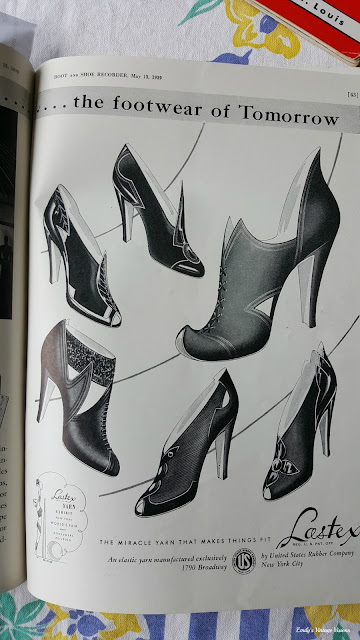Thanks so much for the tremendous feedback on my
1940s beachwear post. I'll have another post coming later this week about the location where the photos were taken.
But now, welcome to another of
Sunday Shoe Spectacle! Today I have some tips on shopping for and fitting vintage shoes. This is a revival of a post a wrote back in 2012 when I first started blogging.
- Are you looking for a particular style to meet the requirements of a particular period of time? And if so, what style? Be sure to do your homework so you know what you are looking at when you start shopping. Many sellers are very knowledgeable but sometimes dates and style names can be listed incorrectly.
- How often do you plan to wear the shoes? If you want a pair of shoes to wear every day, vintage might not be the way to go. But for special occasions, a day in the office, or a night out with the girls or certain types of reenactments they might be just the thing.
- What condition issues should you look for (and avoid) when shopping for vintage shoes? Cracking, scuffs, worn out insoles, broken straps, etc. Avoid leather that looks and feels brittle. Some issues can be fixed with a bit of leather conditioning or polish while other can not.
- What about the details? Heel height, pretty details like bows or buckles.
- And most importantly, how do you know what size shoe to buy?
So how
do you know what size vintage shoes to buy?
It's true that shoe sizes haven't changed too much over the
years, unlike clothing sizes. A size 7 vintage shoe, for example, will
be roughly the same size as a modern size 7. As a
general rule, dress shoes do run a little narrow. And this is
especially true of most vintage shoes the market today, so you will want to keep that in mind
if you have wide feet like I do. If you have the option of trying a pair
of shoes on before you buy them, excellent. But when shopping online,
obviously you won't be able to. Keep in mind that the majority of online
shop owners will not except returns for shoes that don't fit properly. Don't be afraid to ask for more information!
So, to avoid heartaches and headaches alike and know your measurements!

To figure out your measurements - Stand on a piece of paper and have a friend trace the outline of your foot. Take a measuring tape and measure length of your foot from the tip of your big toe to your heel, then across the ball, or widest part of your foot.
Check out this helpful video
Shopper's Tips - To ensure a good fit, measure of a pair of your own comfortable shoes
across the ball of the foot (the widest point), and from toe to heel.
Take both of these measurements on the
inside on the shoes. A
flexible ruler is helpful. Compare these measurements to those of the
vintage shoes you think you want to purchase. It's a good idea to
measure a pair of shoes that have the same heel height as the pair
you're shopping for. If you like your shoes to fit snug or a little on the
loose side, take that onto account.
Condition issues - As with any article of vintage clothing, whether it's a hat, a dress, or
a pair of shoes, expect some kind of wear. Occasionally you will see
NOS - new old stock, or "dead stock" - items in near mint condition.
Excellent condition can mean a higher price.
When looking for shoes, take a look first at the soles and then the
heels. If no pictures are provided ask to see some so you can see how much wear there is. Check for cracks or other flaws to the
soles and heels. If you plan on wearing them for more then the
occasional photo shoot this is important. You want to make sure the
shoes are sturdy and safe to wear. Worn out insoles can easily be
replaced. Scuff marks are no big deal but if there is
cracking anywhere on the shoes that could be a problem, particularly
with leather shoes as they can become brittle with age. Leather
conditioners can help but in some cases the shoes may be beyond repair.
Check the buckles (if there are any) and other details such as the
stitching or decorative bows to make sure they are secure.
Ask yourself - If there are flaws, can you live with them,
considering the age of the shoes of course? Can they easily be fixed? (A
bit of polish or leather conditioner, new insoles, etc.) Is it worth
the extra cost to have them fixed? If you answer "No" to any of these
questions you should probably keep looking.
When in doubt, ask for help!
Don't be afraid to ask questions. When looking for vintage shoes online,
I found the way shoes measurement were listed to be a little
inconsistent, at least on Etsy. One shop will measure the widest point
on the inside of the shoes and other shop across the bottom. Once I knew
what I needed for my own measurements, I asked shop owners to clarify
how their measurements were taken. Each and every person was extremely
help I must say!
Remember, the hunt for the perfect pair of shoes is all part of the fun! :) I hope you find this post helpful.







































